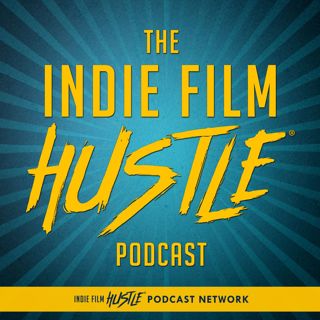
IFH 158: How to Avoid Legal Pitfalls in Indie Film with Walter B. Batt Esq.
If paperwork, contacts and E&O Insurance was as sexy as a new 8K camera then filmmaker would never get into legal trouble when making their film. Alas it is not sexy and filmmakers, myself included, hate even thinking about that side of the business. One thing I've learned over the years is if you don't understand the business side of "show business" you will get burned.Filmmakers ask me legal advice all the time, why I have no idea, and I always say you should speak to an attorney and cover your butt. I've been wanting to have an attorney on the show for a while now to answer not only your legal questions but mine as well. Today's guest is entertainment attorney Walter B. Batt Attorney at Law.Here's a bit about today's guest: Walter Batt is an Entertainment Attorney located in Los Angeles, California. Mr. Batt is a graduate of Arizona State University with a Bachelor of Science in International Business and a Juris Doctor from the University of Miami-Coral Gables. Licensed in Florida and California, his boutique practice focuses, negotiation and contract development in addition to production support for films. With experience in myriad areas of entertainment and general business, Mr. Batt’s client base is diverse consisting of actors, production companies, public relations and marketing agencies, entrepreneurs, and distilled spirits manufacturing and distribution. As a former prosecutor, Mr. Batt occasionally represents selective clients in litigation matters, when required. As an avid exercise guy, Mr. Batt enjoys the gym in addition to films, friends and most of all his best clients--his dogs.Here are some of the filmmaking legal pitfalls we discuss:Can you shoot without a permit on the street?Can you use a corporate logo in your film without permission?What is the truth behind using logos in an indie film?Can you shoot in front of a business with a logo and use it without permission?Do you need to form a company to make a film?Is it necessary to obtain a release from everyone whose face appears on camera?How do I check whether my movie name is available?How do I prepare a prospectus and/or investor memorandum for my film?What type of insurance should a filmmaker consider?What's the deal with referring to copyright/trademarked material in a script?How do I copyright my script?What are some good filmmaking legal resources are out there?When should you begin to work with an entertainment attorney?If you are making a feature, short, web series, streaming show or any content you plan to sell then this podcast is mandatory.Enjoy my conversation with entertainment attorney Walter B. Batt.Become a supporter of this podcast: https://www.spreaker.com/podcast/indie-film-hustle-a-filmmaking-podcast--2664729/support.
25 Touko 20171h 20min

IFH 157: How to Shoot 360 Video & Actually Make Money with Josh Gibson
How to Shoot 360 Video & Actually Make Money with Josh GibsonThis week on the show we have Josh Gibson from 360 Video Academy. I know just enough about 360 video to be dangerous, and not in a good way. I wanted to bring Josh on the show to really break down the myths and techniques on how to shoot 360 video. I also wanted to dive into how filmmakers could ACTUALLY MAKE MONEY shooting 360 video.Josh goes over not only the technical aspects of shooting 360 video but he also discusses how filmmakers can make money and a living shooting this exciting format. How to Shoot 360 Video & Actually Make Money with Josh GibsonThis week on the show we have Josh Gibson from 360 Video Academy. I know just enough about 360 video to be dangerous, and not in a good way. I wanted to bring Josh on the show to really break down the myths and techniques on how to shoot 360 video. I also wanted to dive into how filmmakers could ACTUALLY MAKE MONEY shooting 360 video.Josh goes over not only the technical aspects of shooting 360 video but he also discusses how filmmakers can make money and a living shooting this exciting format. Check out Josh talking shop on 360 video.The 360 Video Academy is your one place to learn how to create professional-grade 360º video content. So get your GoPro 360 Video rig out and take some notes. Enjoy my conversation with Josh Gibson from 360 Video Academy.Become a supporter of this podcast: https://www.spreaker.com/podcast/indie-film-hustle-a-filmmaking-podcast--2664729/support.
18 Touko 201756min

IFH 156: Secrets to Directing a Killer Action Sequence with Gil Bettman
You are in for a treat IFH Tribe. Today's guest is directing guru Gil Bettman.Gil is a seasoned director shooting features, television, commercials and music videos for over 30 years. He has written two best-selling books: Directing the Camera: How Professional Directors Use a Moving Camera to Energize Their FilmsFirst Time Director: How to Make Your Breakthrough MovieOne of his filmmaking mentors is Academy Award-winning director Robert Zemeckis. We discuss what lessons her learned from Mr. Zemeckis and he goes into great detail on how to shoot a killer action sequence. Here's some info on Gil Bettman:No one would ever see Gil Bettman as the retiring type. Bring Academy Award-winning director Robert Zemeckis to his directing class and Bettman wades right in, challenging his old friend's point of view and sparking a good-natured debate about the best ways to tell a story using a camera. But that's Bettman's style. He has very definite opinions about how to block a camera or talk to actors from his days as a top action director for TV series like The Twilight Zone and Knight Rider.Bettman learned the value of subjecting all film ideas to the acid test of a free-wheeling debate from Zemeckis himself while working as a screenwriter developing projects for Zemeckis at Universal and Warner Brothers. It's a lesson Bettman wants to pass on to his students as well.With a degree from Harvard (with honors in English Literature), as well as an M.F.A. from UCLA, Bettman has directed a wide range of projects from feature films to music videos and corporate profiles. He recently directed a feature documentary, The Long Road to Cabo, for rock icon Sammy Hagar, and published a textbook, First Time Director, through Michael Wiese Productions.Enjoy my conversation with Gil Bettman. LINKS AND RESOURCES MENTIONED IN THIS EPISODEGil Bettman - WebsiteHollywood Film & Television Directing Masterclass (EXCLUSIVE 50% OFF)[easyazon_link identifier="161593166X" locale="US" tag="whatisbroke-20"]Directing the Camera: How Professional Directors Use a Moving Camera to Energize Their Films[/easyazon_link][easyazon_link identifier="0941188779" locale="US" tag="whatisbroke-20"]First Time Director: How to Make Your Breakthrough Movie[/easyazon_link][easyazon_link identifier="B00AOQ8MOQ" locale="US" tag="whatisbroke-20"]Point Break[/easyazon_link]SPONSORSDirecting Actors Master Course – (30% OFF – CODE: HUSTLE)Get Your Film on Netflix, Hulu & Amazon & Keep 100% off the Revenue - DistribberHollywood Camera Work: Mastering High-End Blocking and Staging (30% OFF – CODE: HUSTLE)Werner Herzog's Filmmaking MasterClassAaron Sorkin Screenwriting Master ClassFreeFilmBook.com (Download Your FREE Filmmaking Audio Book)KILLER RESOURCES!!!INDIE FILM SYNDICATE Filmmaking CommunityIFH's Online Film SchoolSix Secrets to get into Film Festivals for FREE!To share your thoughts:Leave a note in the comment section below.Share this show onBecome a supporter of this podcast: https://www.spreaker.com/podcast/indie-film-hustle-a-filmmaking-podcast--2664729/support.
9 Touko 20171h 14min

IFH 155: What the Heck is a Line Producer with Sevier Crespo
What the Heck is a Line Producer with Sevier CrespoI've been asked by the tribe to do a show on what the heck is a line producer. Ask and you may receive. Today's guest is Line Producer Sevier Crespo. Sevier is line producer that works in the indie film world. He knows how to handle lower budgets and get the most out of them.According to Wikipedia: a line producer is a type of film producer who is the key manager during daily operations of a feature film, television film, or an episode of a TV program. A line producer works on one film at a time. They are responsible for human resources and handling any problems that come up during production.I wanted to have Sevier on the show to really go over how a good line producer can help you on your productions. He's been around the biz for years working with legends like Jerry Bruckheimer, Michael Mann, Ridley Scott, Tony Scott and Joe Petka to name a few. Here's some info on today's guest. Producer Sevier Crespo, p.g.a., is a dynamic force in film and television production, known in the industry as the man who conquers impossible circumstances to bring projects in on schedule and on budget. Accolades for his projects include BEST AMERICAN COMEDY at the NY International Film Festival, TV GUIDE’s Hot List (the only web series to make the list), a Parents’ Choice Award, and a Mom’s Choice Award. And it’s no wonder since he learned the ropes from heavyweights, Jerry Bruckheimer and Michael Mann.Crespo may have cut his teeth on sequels to “Bad Boys” and “Chainsaw Massacre,” but $5-million-and-under budgets are where Crespo really shows his prowess. He developed, created, wrote, produced, line produced and acted in “Jackers” with a budget of $50k. The feature film grossed $500k in its first quarter and has taken in over $5 million since. Crespo also saved a film that was $60k in the hole (with a budget of $225k) and brought it in on budget and on schedule. And when he delivered an NBC pilot (starring Mandy Moore and James Roday) on time and on budget too, he was not only praised for an LA/NY shoot with the micro-budget, but also literally shocked a network exec over the project, who looked him straight in the eye and said, “How the fuck did you manage to do that?”Crespo studied production at UCLA and learned the ropes under the tutelage of Robert Townsend and director Sam Bayer at Ridley Scott’s RSA USA, Inc. He’s since worked with such global brands as Adidas, Coca-Cola, Nike, Marlboro, Mitsubishi, NBC, and Netflix – to name a few. Tapping back into his latin roots, Sevier worked alongside Danny Trejo in the comedy “Pendejo” and the upcoming feature “Deceived” (2017).Enjoy my conversation with Line Producer and Producer Sevier Crespo.LINKS AND RESOURCES MENTIONED IN THIS EPISODESevier Crespo - IMDBSevier Crespo - WebsiteTwitterFacebookSPONSORSHollywood Film & Television Directing Masterclass (30% OFF)Directing Actors Master Course – (30% OFF – CODE: HUSTLE)Get Your Film on Netflix, Hulu & Amazon & Keep 100% off the Revenue - DistribberHollywood Camera Work: Mastering High-End Blocking and Staging (30% OFF – CODE: HUSTLE)Werner HBecome a supporter of this podcast: https://www.spreaker.com/podcast/indie-film-hustle-a-filmmaking-podcast--2664729/support.
3 Touko 20171h 10min

IFH 154: How to Direct the Character, Not the Actor with Mark Travis
This week I have the pleasure of having directing coach Mark Travis on the show. I was introduced to him after I watched his stellar workshop Hollywood Film Directing, which he co-instructed with Gil Bettman (he’ll be on the show soon). Mark Travis has developed a new way to directing actors called The Travis Technique. Mark teaches directors how to direct the character (not the actor) in order to create instantaneous authentic performances, even on tight schedules and tiny budgets. Here’s a bit on The Travis Technique.Acting is too often just pretending. And most directing is demanding and controlling and result oriented. And consequently, the final product suffers. But it doesn’t have to be that way. When you use The Travis Technique, you can achieve instantaneous and authentic performances from actors that are deeply felt by audiences. The Travis Technique is an organic approach to directing actors that is guaranteed to create authentic characters and performances by shifting the focus from directing the actor to directing the character.Mark Travis first created his techniques out of the necessity to generate the most authentic performances within actors under a tight schedule and often an even tighter budget. In the last 20-years the Travis Technique has grown and is now used by some of the best directors, actors and writers in Hollywood and the international film market. Mark has taught The Travis Technique to students all over the world in over 50 film schools.When actors, directors and writers use the Travis Technique, it’s not just a performance anymore. It becomes REAL! The Travis Technique creates organic authenticity in every performance and under all circumstances. This translates immediately onto the screen and gains enormous attention for the director, actor, and writer.Recommended by Hollywood’s top brass: Mark Rydell, Art Seidelman, Randal Kleiser, George Tillman, Asaad Kelada, Jan Eliasberg, John Badham and other A-listers. For over 20-years Mark Travis has been sharing his award-winning techniques on writing, acting and directing worldwide.Most directors make a critical mistake: They direct only the actor, not the character. And that is just one of the many techniques directors must master. They also must learn how to expertly stage scenes, understand exactly how camera angles intensify or diminish a shot amongst hundreds of other skills to become a renowned, in-demand, and working director.Winner of over 30 directorial awards, teaching internationally in 50 prestigious film schools, for the past 20-years Mark Travis’ workshops and seminars have covered the entire filmmaking process including: all stages of preparation, pre-production, production, and post-production. Mark has been instrumental in launching successful directorial careers in the US and internationally.Sought out by the most experienced directors, Mark now teaches his signature Travis Technique: a simple, immediate, and powerful Directing Tool, directors can use to achieve instantaneous authentic performances that translate brilliantly onto the screen.Enjoy my conversation with Mark Travis.Become a supporter of this podcast: https://www.spreaker.com/podcast/indie-film-hustle-a-filmmaking-podcast--2664729/support.
24 Huhti 20171h 56min

IFH 153: Why You Need to Get Off Your Ass NOW & Make Your Film
Why You Need to Get Off Your Ass NOW & Make Your FilmI think the title speaks for itself. Every once in a while I need to hear some stories that inspire me to get off my ass and make sh*t happen. I hope this episode helps inspire you to get off your ass and make your film happen!Right click here to download the MP3Download on iTunes DirectWatch on IFH YouTube ChannelLINKS AND RESOURCES MENTIONED IN THIS EPISODEHow to make a $1,000 Feature Film with Jay & Mark DuplassJoe Swanberg: How to Shoot & Sell Six Feature Films in a Year!SPONSORSDirecting Actors Master Course – (30% OFF – CODE: HUSTLE)Get Your Film on Netflix, Hulu & Amazon & Keep 100% off the Revenue - DistribberHollywood Camera Work: Mastering High-End Blocking and Staging (30% OFF – CODE: HUSTLE)Aaron Sorkin Screenwriting Master ClassHans Zimmer Film Scoring MasterClassKevin Spacey Acting Master ClassFreeFilmBook.com (Download Your FREE Filmmaking Audio Book)Hulu PlusKILLER RESOURCES!!!INDIE FILM SYNDICATE Filmmaking CommunityIFH's Online Film SchoolSix Secrets to get into Film Festivals for FREE!Become a supporter of this podcast: https://www.spreaker.com/podcast/indie-film-hustle-a-filmmaking-podcast--2664729/support.
21 Huhti 201720min

IFH 152: How to Build an 8 Million Following YouTube Empire with RocketJump's Dez Dolly
How to Build a YouTube Empire with RocketJump Co-Founder Dez DollySo I want you to get ready for an epic podcast. Have you ever been surfing through Youtube and come across a channel with 5, 8, 10 million followers and ask yourself:"How the hell did they build that audience?"I do all the time. Over the last year, I've had the pleasure of working on a killer new show called Dimension 404 for Hulu and Lionsgate. The series is created and produced by the boys over at Rocket jump. Now, Rocketjump is one of those Youtube channels with 8 million followers I was talking about. I had the opportunity to sit down with on of the co-founders of Rocketjump and show runner of Dimension 404 Dez Dolly.Here some more info on Dez Dolly:Desmond Dolly is a writer, director, producer who got his start in the industry selling TVs at an Indiana Best Buy. After graduating USC Film School - Dez wrote and directed an independently financed feature film, Champion of Glory, while climbing the ranks as a commercial director & editor. Building a post production company from the ground up, Dez cut his teeth on AAA ad campaigns, boasting a client roster that includes Google, Viacom, Warner Brothers, Fox, Visa, Kraft, Dodge, Samsung, and AT&T, to name a few.In 2010, Dolly partnered with film school classmates Freddie Wong and Matt Arnold to form the digital production company and entertainment banner, RocketJump.com. There, Dez and his partners pioneered new forms of online video, bringing professional content to the YouTube platform. Their culturally influential viral videos have accumulated over 7 million subscribers and tallied over one billion views, making Dez one of the most watched video directors on the global web.The first season of his flagship web series, Video Game High School, gained over 130 million cumulative views over 21 episodes, and was named "#1Web Series of 2013" by Variety. Season 3 was heralded as a must-see People pick in 2014, and was nominated for a 2015 Producers Guild Award for Outstanding Digital Series.Dez Executive Produced and co-starred in the Hulu docu-reality series, RocketJump: The Show. In 2017, Dolly renewed his first look deal with Lionsgate and served as creator and executive producer of Hulu sci-fi anthology series, Dimension 404.Dez is a wealth of information and drops some MAJOR knowledge bombs in this episode. If you've ever wondered how you could build an audience of almost 8 million the perk up your ears and get ready to take notes.Enjoy my conversation with Dez Dolly from Rocketjump.Right click here to download the MP3Download on iTunes DirectWatch on IFH YouTube Channel Become a supporter of this podcast: https://www.spreaker.com/podcast/indie-film-hustle-a-filmmaking-podcast--2664729/support.
18 Huhti 20171h 48min

IFH 151: How to Shoot 96 Script Pages in 4 Days
So after I posted the video below I was slammed by emails and messages from the IFH Tribe asking for details on how I shot 96 pages of a visual effect heavy series in just 4 days. The series is called The S.P.A.A.C.E Program and I was hired to direct and post the series by Legendary Pictures Digital and Nerdist. I decide to pump out a podcast detailing my techniques and tips on how to shoot large volumes of script pages fast. We average between 90-110 camera setups a day...CRAZY! Couldn't have done it without my amazing cast and crew. At the end of this journey, we'll have eight episodes running about 12 minutes each. I still can't believe we did it. One thing I forgot to mention in the podcast is to use fast gear. We shot on the Blackmagic Ursa Mini 4.6k which lived mostly on sticks. This is my camera of choice now as it gives you the biggest bang for your buck. We also use a Dana Dolly which made moving the camera a breeze. Take a listen to this crazy journey and I hope you can pick up some useful knowledge that will help you on your filmmaking journey.Right click here to download the MP3Download on iTunes DirectWatch on IFH YouTube ChannelBecome a supporter of this podcast: https://www.spreaker.com/podcast/indie-film-hustle-a-filmmaking-podcast--2664729/support.
14 Huhti 201722min





















